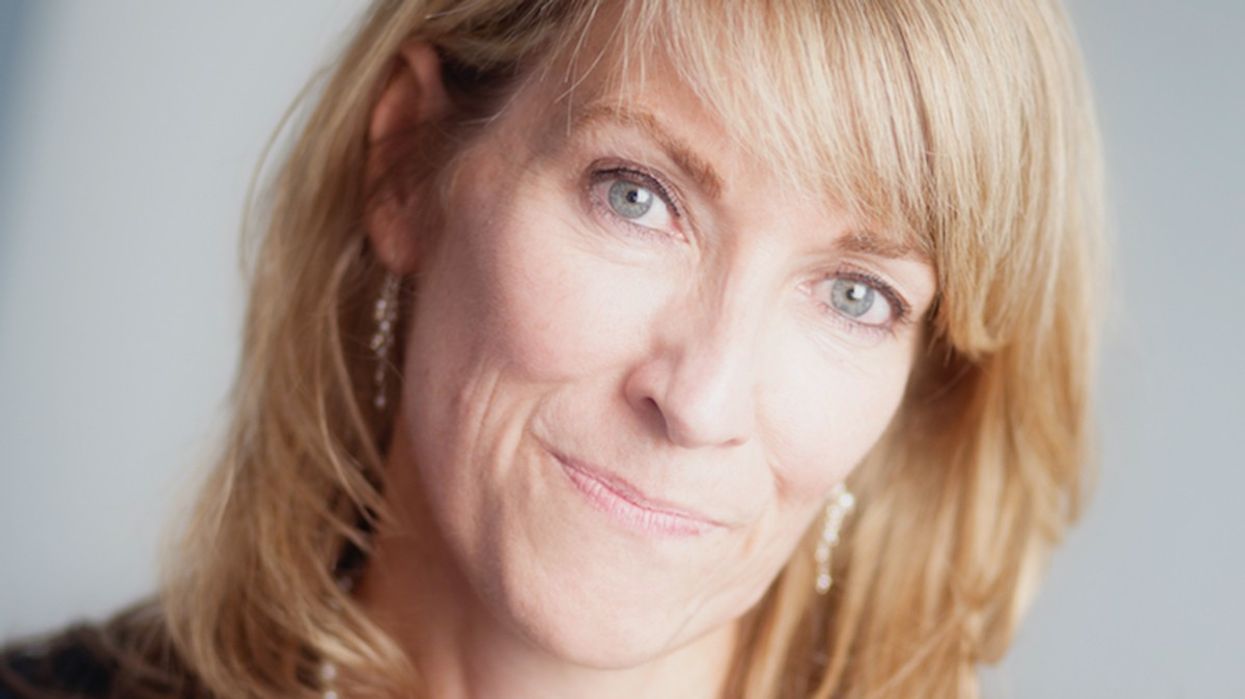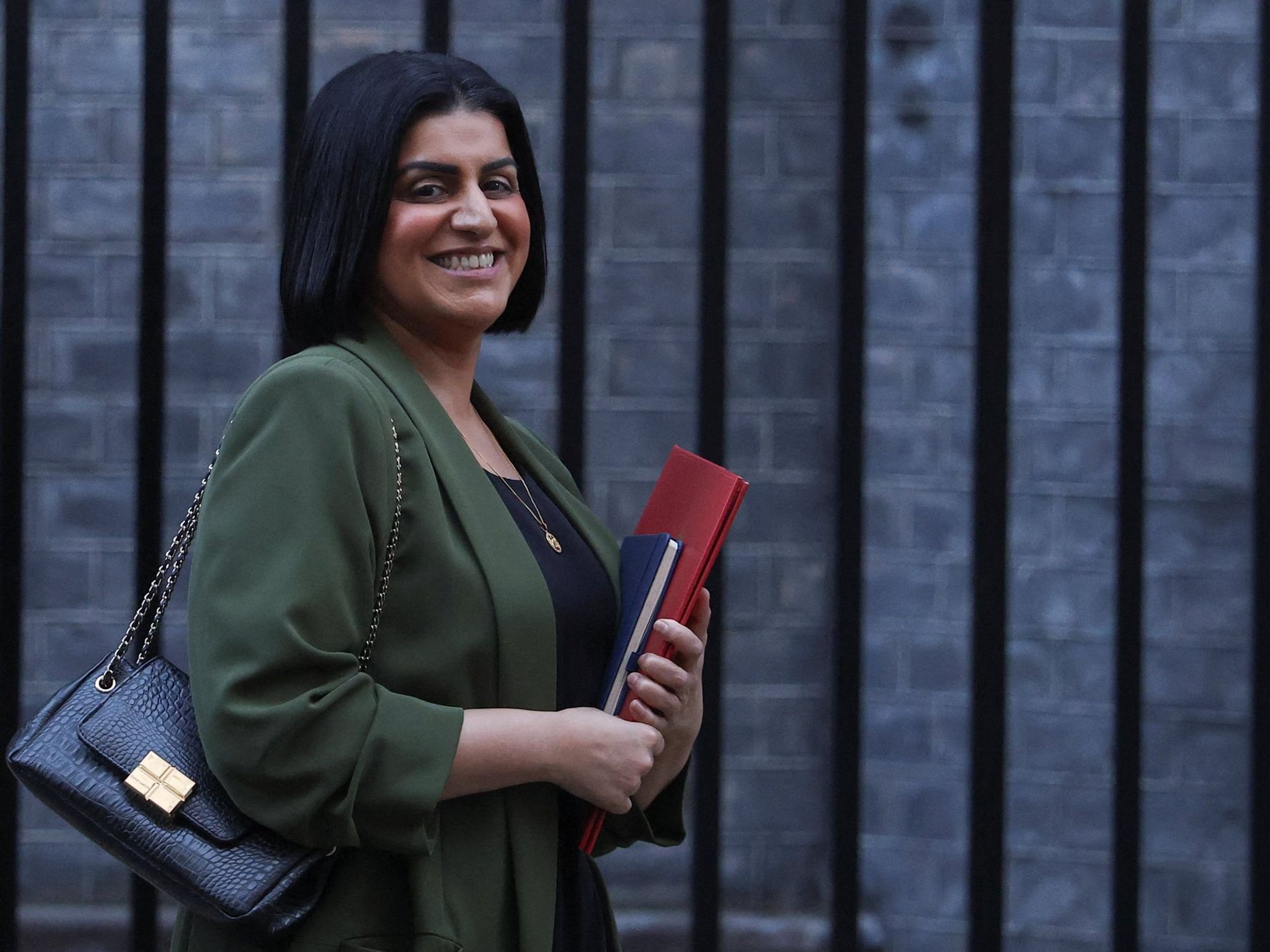Doctor Q&A: What is the best drink for lowering high blood pressure? Dr Renee Hoenderkamp answers your burning health questions

Celebrity NHS doctor Renée Hoenderkamp addresses GB News members' burning questions
|Doctor Renée Hoenderkamp

In this week's Q&A, celebrity NHS Doctor Renée Hoenderkamp gives her take on the best drink for reducing high blood pressure, what heavy periods signify and how to alleviate chest pain
Don't Miss
Most Read
Latest
When it comes to your health, even small changes can make a big difference.
This might be speaking to a doctor about a worrisome symptom or tweaking your diet.
This week, celebrity NHS Doctor Renée Hoenderkamp helps GB News members achieve both.
In this week's Q&A, our resident doc delves into the literature supporting natural remedies for hypertension, how to alleviate chest pain in your twenties and what irregular periods signify.
Don't forget to send any burning health questions you have to health@gbnews.uk and Doctor Renée will respond.
Last week, she addressed the best snack for lowering blood sugar, a healthier alternative to warfarin and everything you need to know about Crohn's disease
It's important to remember that the advice given below is general and not individual and you should always seek individualised health care from a doctor.
With those caveats aside, see below Doctor Hoenderkamp's answer's to GB News members' burning questions.
Hey Dr Renee, I am hoping you can help. I'm 29 and I've been having regular periods for at least three years now. Over the last few months my cycle has become irregular. My period came on late this month and last month and I have started getting heavy periods. It's draining me physically and mentally. It's not painful but I'm feeling weak. Do you have any advice or information on what's going on? Thank you
Irregular periods can have many causes so I will describe the most common causes and point you in the right direction so that you know what to ask your GP when you see them, as you must!
Just to recap, a period occurs 14 days after an egg is released from an ovary during our reproductive years, usually between the ages of 12 and 51. Anything that delays that release can cause or even stop periods for extended periods.
The most common causes include (but are not limited to):
- Polycystic Ovarian Syndrome (PCOS)
- Pelvic inflammatory disease (infection) PID
- Stress
- Thyroid dysfunction
- Excessive exercise
- Low BMI/malnutrition
PCOS
Cysts form on the ovaries and ovulation can be delayed from a few days to years. The cysts build up in the ovaries which secrete higher than usual level of male hormones (androgens), particularly testosterone. This causes all reproductive hormones to become imbalanced and blood tests can see raised LH, FSH, testosterone, prolactin, FAI and/or low SHBG and oestradiol. This in turn can cause and be caused by obesity and lead to excess facial hair (hirsutism), male pattern baldness, anger and mood changes. Alongside this, heavy periods, infertility and migraines can occur.
PCOS is easy to test for, you need two of the following for a diagnosis, and you already have one:
- Irregular periods
- Deranged female hormones
- Polycystic ovaries on ultrasound scan
If this is causing the problem there are lifestyle and medical solutions. Losing just five percent of body weight can trigger ovulation and help normalise hormones.
There are medications to lower testosterone; high progesterone contraceptive pills, spironolactone (a blood pressure pill that does the same) and metformin, a diabetic drug which helps weight loss and can trigger ovulation (the evidence is weak but I have seen it work).
PID/infection
Infection itself or the more serious and complex pelvic inflammatory disease can cause irregular bleeding. You may also get other symptoms which include offensive discharge (yellow/green/smelly), abdominal pain and fever. It is important to recognise and treat infection as quickly as possible to minimise permanent damage to the fallopian tube (the tube that carries an egg from the ovary to womb). This is usually simple enough and a vaginal swab, either self done or by a nurse/doctor, is the first approach, followed by an ultrasound scan.
Stress
Stress can alter periods dramatically. I have seen stress cause periods to stop for over a year. This is thought to occur as stress hormones such as adrenaline and cortisol, directly and indirectly, interfere with menstrual hormones.
This is very difficult to manage - especially when you are worried about it.
Try to take remedial relaxation steps such as yoga and acupuncture.
Thyroid dysfunction
The thyroid gland, situated in the front of the neck, is a butterfly-shaped gland that is the engine room for just about every process in the body.
When it is working overtime or going slow it can affect periods so that they come sooner than normal and are very heavy or further apart and lighter.
There is a simple hormonal blood test for this but make sure your doctor asks for TSH, FT4 AND FT3.
Low BMI/Malnutrition
Excessive or rapid weight loss can result in periods becoming less regular or stopping. It causes parts of the brain stop releasing hormones involved in the menstrual cycle, causing hypothalamic amenorrhea (absent periods). Alongside this you may develop:
Dry skin
Thinning hair
Tiredness
Difficulty concentrating
Difficulty getting warm
Low mood - this usually happens when BMI drops below 18.5 and needs expert help and management.
Excessive exercise
Excessive exercise can also interfere with the hormones responsible for periods. Often seen in female athletes, dancers, and others who train intensively. If intense exercise is combined with a restrictive diet, a person might develop the “female athlete triad,” or REDs, and includes:
- Disordered eating
- Menstrual changes
- Low bone mineral density (osteoporosis)
Some people find it hard to stop exercising, and the medical term for this is compulsive exercise. Again this will need specialist input from a specialist.
Finally don’t forget to ensure that you are not pregnant - some women carry on bleeding throughout pregnancy!
Hi, I am in my twenties and have constant chest pain - what can I do to alleviate it?
Chest pain in young people is rarely a worrying sign but it is impossible for me to tell you what is causing yours without knowing more/examining you. I know that people automatically worry about their heart but this is the least likely, but not impossible cause. For this reason, you must see a doctor about any chest pain.
The most common cause of chest pain in a young person is chest wall pain (costochondritis) and anxiety (panic disorder).
Costochondritis is inflammation of the cartilage between the sternum and ribs adjoining it. This is often caused by gym work and is common in young men lifting heavy weights. The treatment is rest and anti-inflammatory medication for pain.
Anxiety can cause chest tightness and even pain which is usually relieved as the acute anxiety episode subsides and longer-term CBT can help deal with the thought processes which are causing the anxiety.
A common cold or chest infection causing coughing can strain the muscles of the ribs but is usually only felt when coughing or moving in certain ways and the onset has come clearly and shortly after the cough started.
A less common but more serious causes include pleurisy, pericarditis, myocarditis, pneumothorax or cardiac hypertrophy and all of these should be considered by the medical practitioner and ruled out (if not the cause).
A 12 lead ECG which takes an electrical picture of your heart, some blood tests for infection, inflammatory markers and signs that your heart is working hard are the first and essential tests. Then a Chest X-ray and/or an echocardiogram may be next on the list.
As I started, chest pain is too hard to diagnose for you, and is likely nothing serious, but just in case it is serious please see your doctor as soon as possible
Hi Doctor, I am hoping you can help. What is the best tea for lowering high blood pressure? My numbers are high but trying to avoid medication. I have seen several studies linking herbal tea to reductions but not sure if this is bunkum
Firstly, the most effective way of lowering high blood pressure is exercise and weight loss. Even brisk walking for 10-15 minutes a day has been shown to reduce blood pressure significantly.
There is, as always, very little decent evidence for alternative remedies for blood pressure so I had a look around and I did find some positive information around a herbal tea hibiscus sabdariffa.
This study showed positive effects in the intervention group who all had stage I hypertension, which is defined as hibiscus sabdariffa systolic pressure of 130 to 139 mm Hg or diastolic of 80 to 89 mm Hg. The study is here.
For reference, these are the stages of hypertension:
Stage 1 hypertension - clinic BP 140/90 mm Hg to 159/99 mm Hg and subsequent ABPM daytime average or HBPM average blood pressure 135/85 mm Hg to 149/94 mm Hg
Stage 2 hypertension - clinic BP 160/100 mm Hg or higher but less than 180/120 mm Hg and subsequent ABPM daytime average or HBPM average blood pressure of 150/95 mm Hg or higher
Stage 3 or severe hypertension - clinic systolic BP 180 mm Hg or higher or clinic diastolic BP 120 mm Hg or higher
It is also worth mentioning that Barts and The London Hospital did some interesting studies involving Beetroot juice. The study showed that drinking 250mls of beetroot juice a day returned elevated blood pressure to normal. It looks like nitrate is the active ingredient. The details are here. But it seems only to reduce systolic - not diastolic blood pressure.
It does look as though many other natural veggies/fruit make similar claims.
So in short and with some caveats, I don’t think the idea is bunkum but it depends on how high your blood pressure is and what stage you are at and if it's beetroot you are looking at, it benefits men but not women.
I am a supporter of trying to manage most things with diet and exercise so that would be my first approach and there is no harm.










